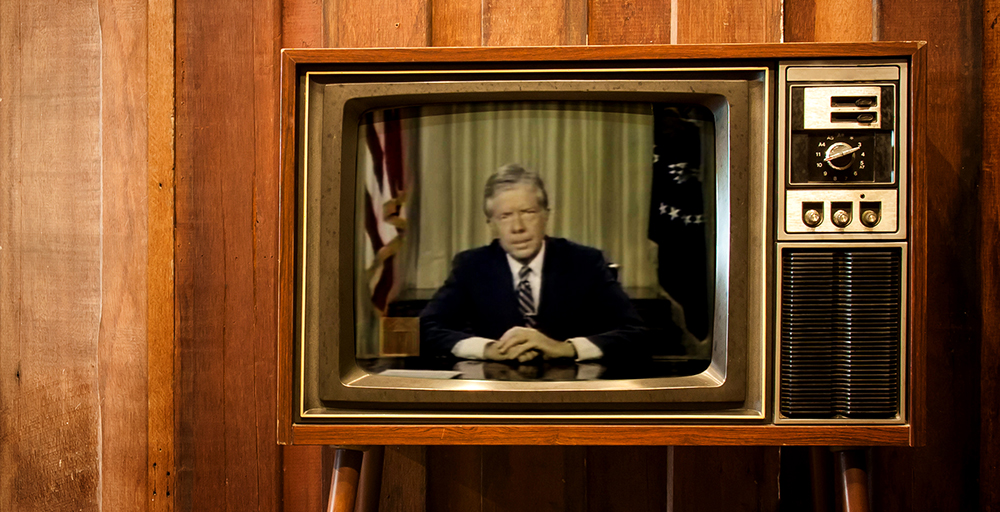
On July 15, 1979, President Carter came on the television and told Americans what we already knew – that we had come a long way from Kennedy’s Camelot; that patriotic optimism and national cohesion were circling the drain:
The threat is nearly invisible in ordinary ways. It is a crisis of confidence. It is a crisis that strikes at the very heart and soul and spirit of our national will. We can see this crisis in the growing doubt about the meaning of our own lives and in the loss of a unity of purpose for our Nation.
It was the summer of 1979. We looked back upon the decade that was coming to a close, and could see the wreckage in its wake. Our entire perception of the government and what it meant to be an american had been turned on its head.
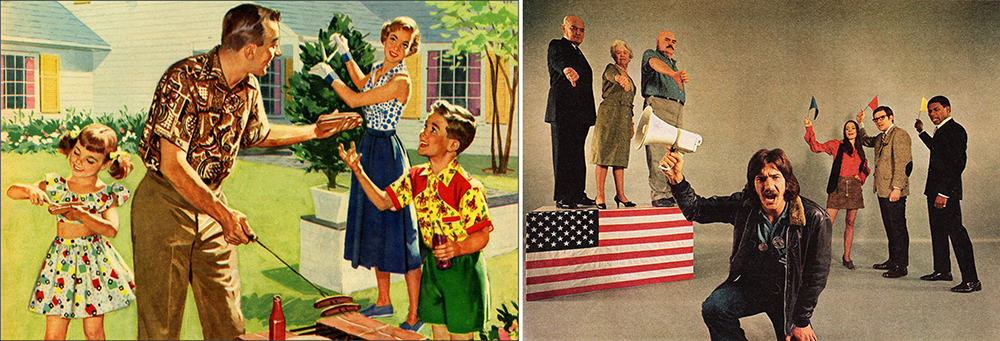
What caused this titanic shift? What could turn the tide so dramatically in such a short amount of time? It certainly couldn’t be narrowed down to one thing, and even this falls way short explaining the crisis of confidence. But we can focus on some of the primary sources for this malaise, this loss of unity, which continues to this day.
WATERGATE
Patriotism goes bye-bye, and the government is not to be trusted.
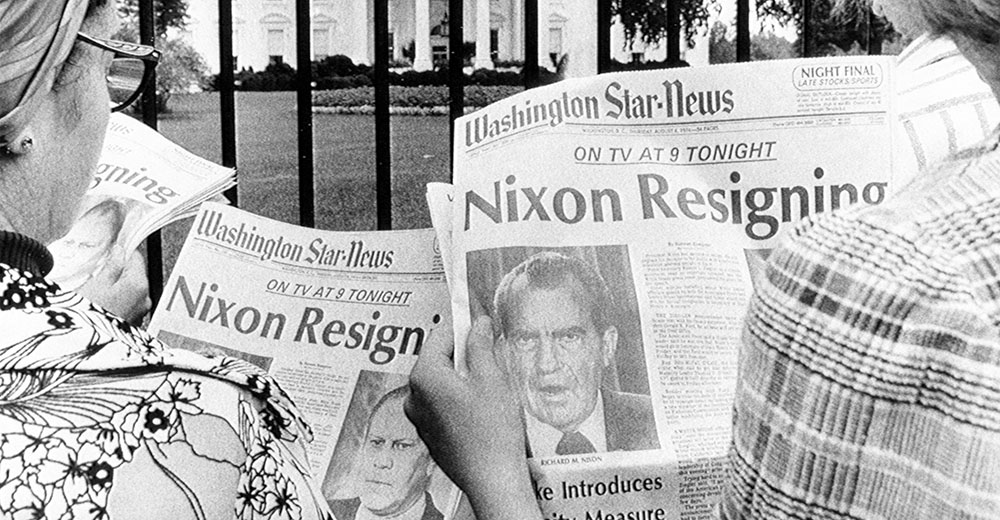
Camelot was about a decade in the rear-view mirror by the time Nixon was indicted in 1974, and Americans already were losing their patriotic mojo thanks to Vietnam… but this may have been the proverbial nail in the coffin. Was Kennedy pure as the wind-driven snow? Of course not, but thanks to the Watergate fallout, we couldn’t pretend any longer: there was genuine corruption in the highest offices in the land, and Americans would be jaded and cynical towards their government going forward. Would the upcoming presidents commit even worse acts of deceit? Most definitely. But now it is expected; we’d taken the sucker punch to the gut and seen the emperor with no clothes – and there was no going back to the unblinking widespread patriotism of decades past.
ROE v. WADE
Politics Permanently Polarized
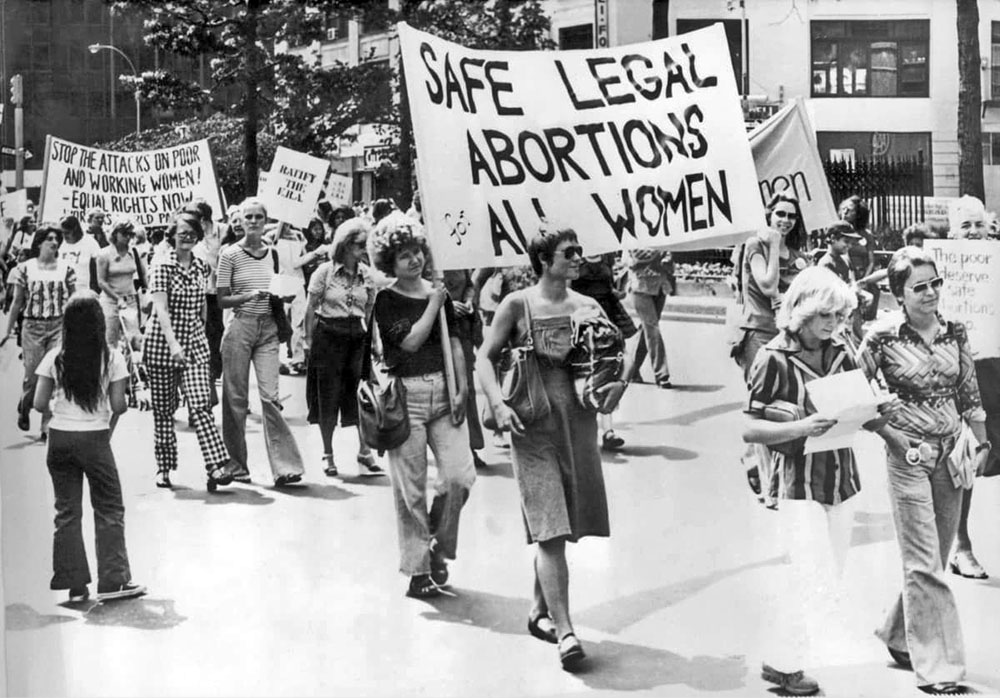
I won’t go into whether the legalization of abortion was a good or bad thing in itself, but one negative repercussion can’t be overestimated: it has polarized politics ever since. Whether you are pro-life or pro-choice, you have to agree that this issue drew a clear dividing line that can’t be bridged. Ever since, the political landscape has seen a toxic level of partisanship stemming from this point of contention… and the polarization gets wider every day.
DIVORCE RATES SKYROCKET
The stable nuclear family takes a hit
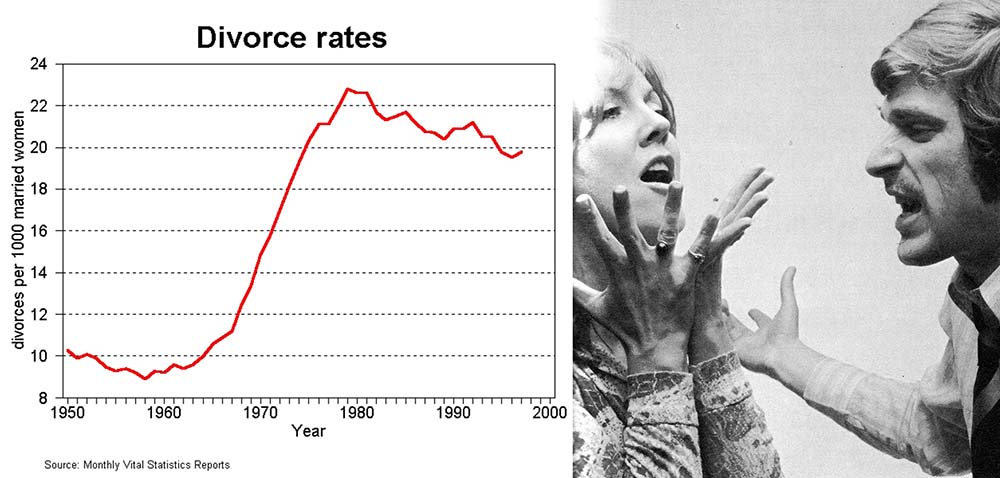
Removing the stigma of divorce was perhaps a good thing overall in that a lot of violent, unhappy marriages were mercifully allowed to dissolve. However, the flip-side is that 1970s saw an unprecedented number of families break apart, leaving in its wake a generation of kids scarred by the event. Sure, many homes were better off, but the net result coming out of the 70s was that the stable American nuclear family, so prized at mid-century, had taken a catastrophic blow.
THE GOLD STANDARD ABOLISHED
Goodbye gold backed dollars, hello sky’s the limit spending

On August 15, 1971, Nixon made this announcement to the nation:
We must protect the position of the American dollar as a pillar of monetary stability around the world. In the past 7 years, there has been an average of one international monetary crisis every year… I have directed Secretary Connally to suspend temporarily the convertibility of the dollar into gold or other reserve assets…
I’ll leave the debate to the economic experts on whether Nixon’s decision was necessary to save the US economy. What can’t be argued is that this enabled the government to spend with abandon. No longer held to a precious metal standard, the country sunk into the so-called “stagflation” and the debt shot into the stratosphere. As of this writing, the US National Debt Clock puts us at about $20.6 trillion – an impossibility without a floating fiat currency.
VIETNAM
The war in the jungle against communism loses popularity, and so does national pride and cohesion
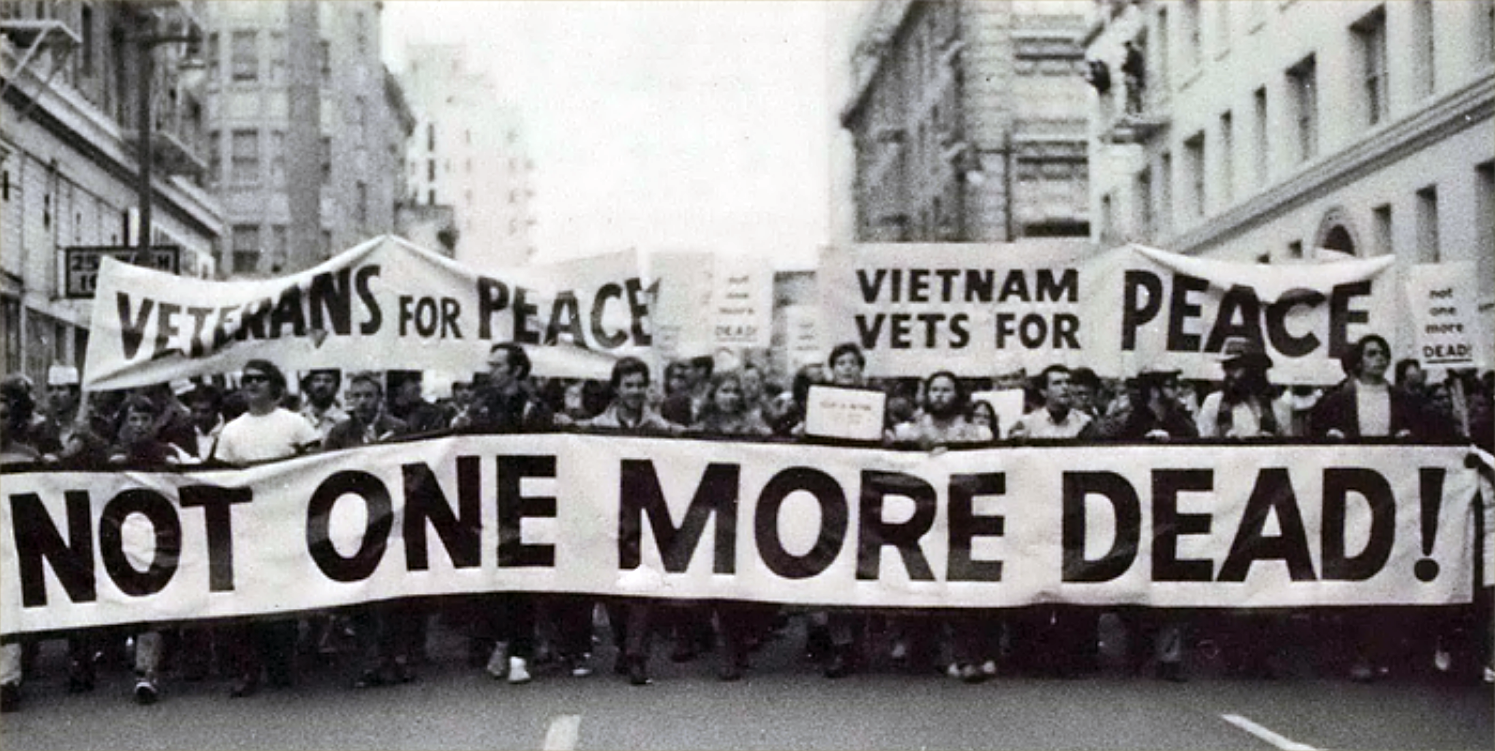
By the time we pulled out of Vietnam in 1975, we’d already been embroiled in combat for over a decade. So, this is by no means an event exclusive to the 1970s. That being said, the last few years were a bitch. Protests were rampant, and a clear adversarial relationship between government and populace was firmly established. The perception that the government was there to protect you and had your best interests at heart was laid to rest. The government was sending kids who couldn’t afford college to their death in far off jungles for unclear gains. National pride took a lethal hit and has never recovered.
INFLATION
The post-WWII boom fizzles
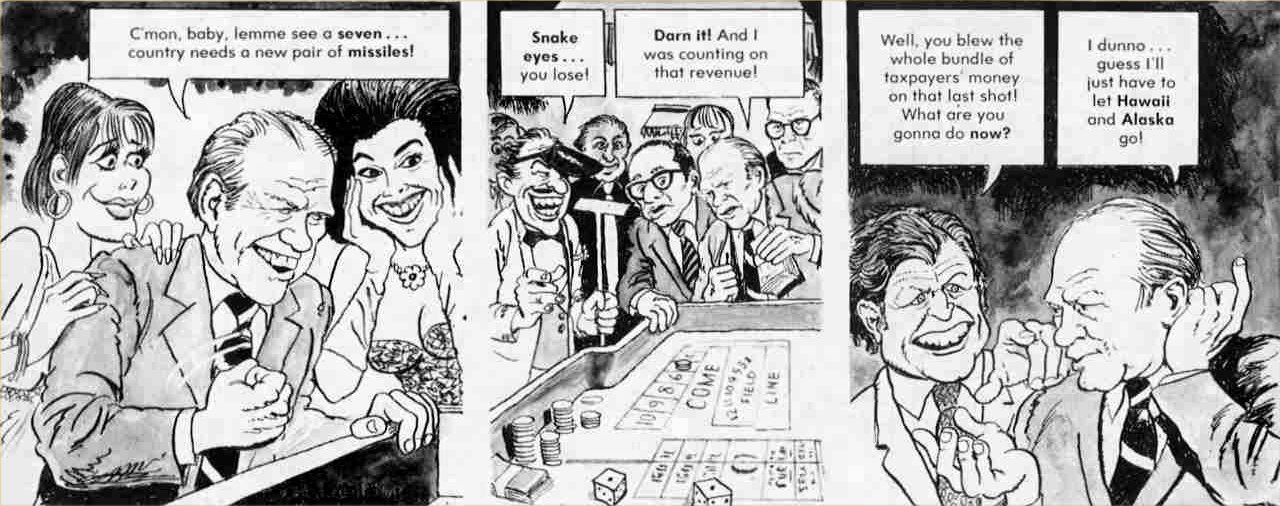
From a 1970s issue of Marvel’s Crazy Magazine featuring President Ford
Ever since World War II, the US had enjoyed an economy that was absolutely booming. The Boomers were brought up in an age of plenty, only to reach adulthood and become disenchanted by an economy that was rapidly going to shit. The 1970s saw the stock market loses 40% in an 18 month period and unemployment reach double digits. The future looked bleak.
Let’s face it, the optimism of the 1950s and 1960s was largely due to seemingly infinite piles of cash, and a total domination of the world’s economy. The crisis of confidence came about because so much of American pride and nationalism was tied up in the value of the dollar; once the USD plummeted, so did that that trademark mid-century spirit.
THE ENERGY CRISIS
The American love affair with the automobile ends in oil shortages and public rage
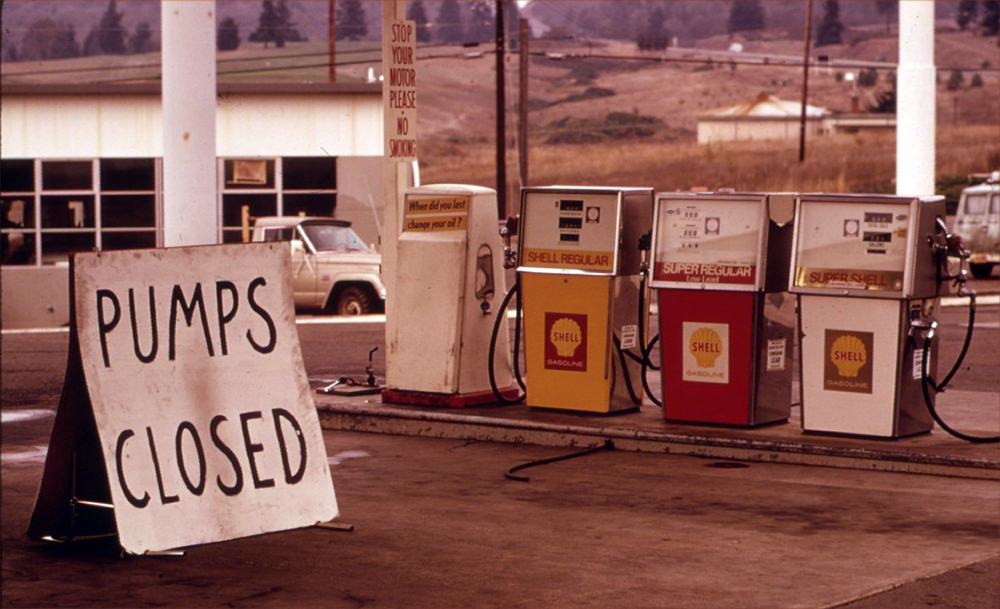
Most Americans didn’t even know we were importing our oil until the gas crisis hit, then we all knew.. the fuel that ran the country was in the hands of the Middle East and out of our control. Arab members of OPEC put in place an embargo on oil to the US and cut back production in response to American support of Israel in the Yom Kippur War in 1973. After decades of abundant supply, Americans now faced shortages – and, perhaps worse, a dawning of realization that we are no longer steering this ship. The very fuel that powers the cars, homes, businesses – the life blood of the American life – is in the hands of foreign powers. It was a startling revelation, and permanently shattered the trademark American independent spirit as well as the confidence that goes with self-reliance.
The New York Post said it best on Independence Day 1979: “Tthe American paradox is bleakly apparent. As a nation, we appear to have become steadily more dependent on forces seemingly beyond our control, losing confidence in our ability to master events, uncertain of our direction.”
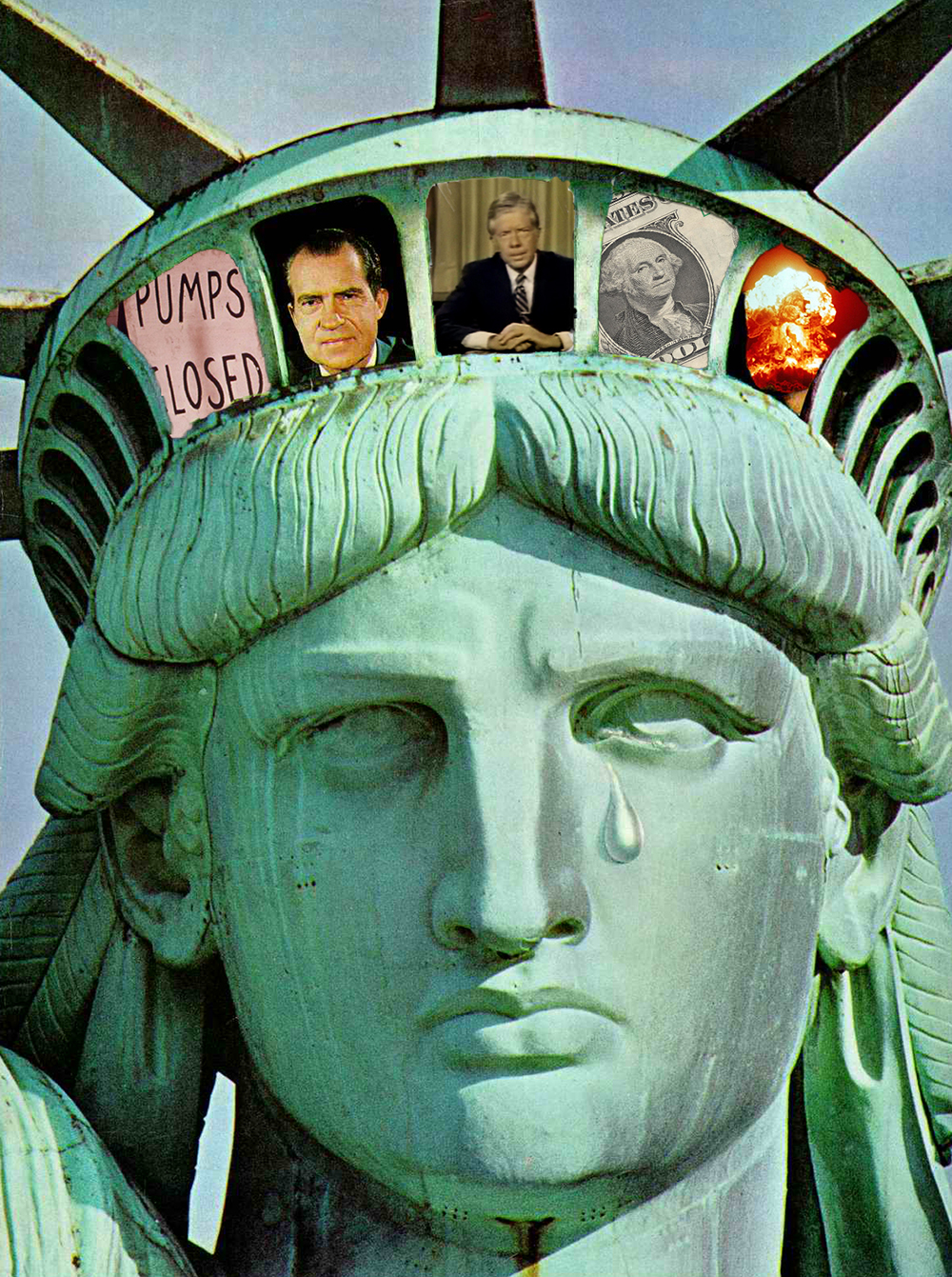
Of course, we could roll out many more factors that came about in the 1970s, but we’ll stop here. Yes, it’s a bit of a downer. Carter’s words in 1979 couldn’t have been more true – but what is really unfortunate is that it certainly has gotten no better since. One could argue that it’s become exponentially worse – the polarization, the lack of national pride, the loss of purpose… it’s all become more grave.
The silver lining is that all nations have their ups and downs, and the dramatic upturns often don’t come about until things have gotten sufficiently horrible. The cliche, “it’s always darkest before the dawn” is apt here. The mistakes of the 1970s can’t be erased, but they can be learned from – indeed, Carter’s speech also contained these words:
We were sure that ours was a nation of the ballot, not the bullet, until the murders of John Kennedy and Robert Kennedy and Martin Luther King, Jr. We were taught that our armies were always invincible and our causes were always just, only to suffer the agony of Vietnam. We respected the Presidency as a place of honor until the shock of Watergate.
We remember when the phrase “sound as a dollar” was an expression of absolute dependability, until 10 years of inflation began to shrink our dollar and our savings. We believed that our Nation’s resources were limitless until 1973, when we had to face a growing dependence on foreign oil.
These wounds are still very deep. They have never been healed….
We’ve got to stop crying and start sweating, stop talking and start walking, stop cursing and start praying. The strength we need will not come from the White House, but from every house in America.”
We know the strength of America. We are strong. We can regain our unity. We can regain our confidence.
Would you like to support Flashbak?
Please consider making a donation to our site. We don't want to rely on ads to bring you the best of visual culture. You can also support us by signing up to our Mailing List. And you can also follow us on Facebook, Instagram and Twitter. For great art and culture delivered to your door, visit our shop.










